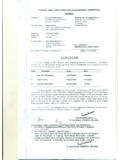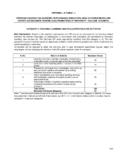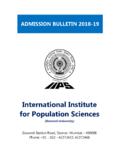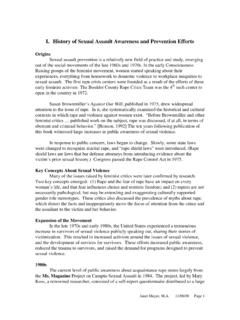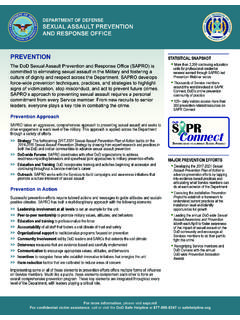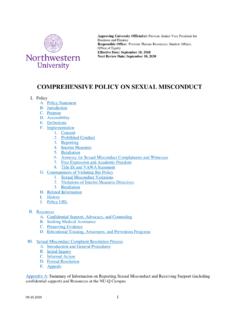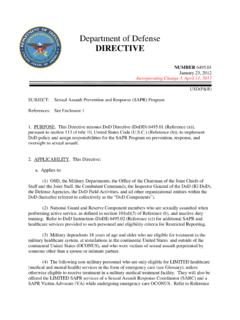Transcription of INTERNAL COMPLAINT COMMITTEE TO PREVENT SEXUAL …
1 POLICY DOCUMENT of INTERNAL COMPLAINT COMMITTEE TO PREVENT SEXUAL harassment OF WOMEN AT THE WORKPLACE GUIDELINES FOR INTERNATIONAL INSTITUTE FOR POPULATION SCIENCES (IIPS) MUMBAI, INDIA INTERNATIONAL INSTITUTE FOR POPULATION SCIENCES (IIPS) (Deemed University) 2 International Institute for Population Sciences (IIPS), 2016 Vision: To position IIPS as a premier teaching and research Institution in the population sciences responsive to emerging national and global need based on values of inclusion, sensitivity, and rights protection. Mission: The Institute will strive to be a centre of excellence on population, health and development issues through high quality education, teaching and research. This will be achieved by (a) creating competent professionals (b) generating and disseminating scientific knowledge and evidence, (c) collaboration and exchange of knowledge, and (d) advocacy and awareness.
2 The document was drafted by the working COMMITTEE on the policy against SEXUAL harassment at the workplace. The working COMMITTEE consisted of: Prof. Sayeed Unisa Dr. Aparajita Chatopadhay Dr. Dipti Govil Dr. Sarang Padgoankar Ms. Ashmita Parab Ms. Atreyee Sinha Ms. Shalini Meshram Ms. Moatula Ao Art work by-------- Logo design by -------- 3 POLICY AGAINST SEXUAL harassment OF WOMEN AT THE WORKPLACE I. Preamble The Parliament of India passed the SEXUAL harassment of Women at Workplace (Prevention, Prohibition, and Redressal) Act, in the year 2013. The ACT provides protection against SEXUAL harassment of women at workplace and for the prevention and redressal of complaints of SEXUAL harassment and for the matters connected therewith or incidental thereto. The guidelines explicitly state the following: It shall be the duty of the employer or other responsible persons in workplaces or other institutions to PREVENT or deter the commission of acts of SEXUAL harassment and to provide the procedures for the resolutions, settlement, or prosecution of acts, of SEXUAL harassment by taking all steps require.
3 Educational institutions are also bound by the Supreme Court s directive and the Act. The International Institute for Population Sciences (IIPS), Mumbai is committed to creating and maintaining an environment which is free of all forms of gender violence, SEXUAL harassment , and discrimination on the basis of sex/gender. Following this, the institute is committed to uphold the Constitutional mandate ensuring the above mentioned human rights of all those who fall within its jurisdiction. As directed by the act IIPS has constituted a COMMITTEE called INTERNAL COMPLAINT COMMITTEE to PREVENT SEXUAL harassment of Women at the Workplace. The following policy has been made keeping in mind the above facts. II. Objectives The objectives of the INTERNAL COMPLAINT COMMITTEE to PREVENT SEXUAL harassment of Women at the Workplace are as follows: To develop a policy against SEXUAL harassment of women at the Institute.
4 To evolve a permanent mechanism for the prevention and redressal of SEXUAL harassment cases and other acts of gender based violence at the Institute. To ensure the implementation of the policy in letter and spirit through proper reporting of the complaints and their follow-up procedures. To uphold the commitment of the Institute to provide an environment free of gender-based discrimination. 4 To create a secure physical and social environment to deter any act of SEXUAL harassment . To promote a social and psychological environment to raise awareness on SEXUAL harassment in its various forms. III. The Definition of SEXUAL harassment According to THE SEXUAL harassment OF WOMEN AT THE WORKPLACE (PREVENTION, PROHIBITION AND REDRESSAL) ACT 2013, SEXUAL harassment includes any one or more of the following unwelcome acts or behavior (whether directly or by implication) namely: 1.
5 Physical contact and advances; or 2. A demand or request for SEXUAL favors; or 3. Making sexually colored remarks; or 4. Showing pornography; or 5. Any other unwelcome physical, verbal or non-verbal conduct of SEXUAL nature. Any act falling under the purview of following cases will be considered as an incident of SEXUAL harassment (Clarification of Unwelcome acts or behavior): a) When submission to unwelcome SEXUAL advances, requests for SEXUAL favours, and verbal or physical conduct of a SEXUAL nature are, implicitly or explicitly, made a term or condition of teaching/guidance, employment, participation, or evaluation of a person's engagement in any activity. b) When unwelcome SEXUAL advances, and verbal, non-verbal and/or physical conduct such as loaded comments, remarks or jokes, letters, phone calls or e-mails, gestures, exhibition of pornography, lurid stares, physical contact, stalking, sounds or display of a derogatory nature.
6 C) Interfering with her work or creating an intimidating, offensive, or hostile environment for her. d) When a person uses the body or any part of it or any object as an extension of the body with a SEXUAL purpose in relation to another person without the latter's consent or against that person's will, such conduct will amount to SEXUAL assault. e) When deprecatory comments, conduct or any such behaviour is based on the gender identity/ SEXUAL orientation of the person and/or when the premises or any public 5 forum of the institute is used to denigrate/discriminate against person(s), or create a hostile environment on the basis of a person s gender identity/ SEXUAL orientation. f) When a person shows any humiliating treatment to woman that is likely to affect her health and safety. g) Teaching activities or explanation of various issues related to fertility, reproductive health and other research topics in a scientific manner will not be considered as harassment .
7 IV. Jurisdiction The policy and the rules & regulations would apply to all students, faculty and non-teaching staffs on active roles of IIPS. The policy and the rules & regulations would also apply to service providers and outsiders who may be within the territory of the IIPS at time of commission of the act coming under the purview of the policy. 1. The policy would apply inside the campus but also on off-campus official duty (workshops, field work, group holidays/excursions organized by IIPS, interviews/meeting with outside people and any other activity organized by IIPS outside the campus including the period of travelling for such activity). 2. In particular, the rules and procedures laid down in this policy shall be applicable to all complaints of SEXUAL harassment made: I. By a student against a member of the academic or non-teaching staff or a co-student or by a member of the academic or non-teaching staff against a student or another member or the academic or non-teaching staff in either case, irrespective of whether SEXUAL harassment is alleged to have taken place within or outside the campus.
8 II. By a service provider or an outsider against a student or a member of the academic or non-teaching staff or by a student or a member of the academic or non-teaching staff against an outsider or a service provider, if the SEXUAL harassment is alleged to have taken place within the campus. In the above, the following definitions will apply: Members of the IIPS include faculty (permanent and temporary), staff (permanent and temporary), research scholars/students (full time and part time) and any other visitors. a. Faculty refers to any person or the staff of the Institute who is appointed to a faculty position, whether full time/temporary/ad-hoc/ part-time/ visiting/ honorary 6 or on special duty /deputation and shall also include faculty employed on a casual or project basis. b. Staff refers to any person in the Institute who is not included in the category of faculty.
9 It shall also include contract workers and daily wagers. c. Research scholars refer to all MPhil/PhD/Post Doctoral Fellows (full time and Part time). d. Students of the Institute include all (Population Studies), (Bio-Statistics and Demography), MPS (regular) /MPS correspondence, (Correspondence) / participants of Short Term Courses. e. Any other visitor refers to any person visiting library / faculty members / any other place in campus; or appearing /participating in interview/ entrance tests /seminars/ workshops/conferences. f. Campus refers to all places of work and residence within the Institute territory. It includes all administrative section, academic section, library & computer centre, project offices as well as hostel & mess, guest house, staff quarters, security cabin and public places, etc.
10 Within the IIPS campus. 3. In order to implement the policy, a COMMITTEE shall be appointed whose composition and mandate would be as described below. V. Constitution of the INTERNAL COMMITTEE The COMMITTEE shall consist of following nine members, who shall be appointed by the Director as under, namely: 1. A senior female Faculty member from the Institute, as the Chair person 2. Two Faculty members(one female and one male) 3. Two Staff members (one female and one male from Group B & C ) 4. Three PhD students (two females and one male) 5. One External female member (preferably lawyer by profession or from NGO committed to the cause of women or familiar with issues related to SEXUAL harassment ) 6. At least one of the members shall be a woman belonging to the Scheduled Castes or the Scheduled Tribes or the Other Backward Classes or minority community notified by the Central Government, from time to time 7.
